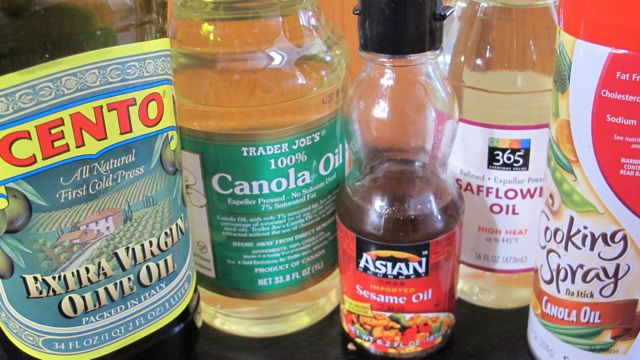Choose the Best Cooking Oil
TEXARKANA, Ark. –
Choosing the right cooking oil can be a downright daunting task. There are so many choices: olive, canola, peanut, sesame, vegetable, corn, and the choices seem to go on and on.
To choose the best, you need to consider nutrition – how high in fat and what type of fat is in it, what flavor will it give and how heat tolerant is the oil. Some oils will smoke and burn if they are heated too high.
Oil does have a limited shelf life and will not keep forever. Most oils, if unopened, will have a shelf life of one year. Once opened, most stay fresh for about six months. After that period of time, they can become rancid and develop an undesirable taste. Be sure to keep your cooking oils tightly covered and away from light and heat. Therefore storing it above or next to the stove is not the best storage option.
When it comes to total fat and calories, all cooking oils provide about the same 14 grams of total fat and 120 calories per tablespoon. The difference lies in the proportions of saturated, monounsaturated, and polyunsaturated fatty acids that the oil brings to the table.
Saturated fats tend to raise LDL, the bad or “lousy” cholesterol levels, so it’s best to limit your intake of these types of fats to less than 7 percent of total daily calories. These are the fats that are typically solid at room temperature and found mostly in foods from animals and some plants. Foods from animals include beef, beef fat, veal, lamb, pork, lard, poultry fat, butter, cream, milk, cheeses and other dairy products made from whole and 2 percent milk. All of these foods also contain dietary cholesterol. Foods from plants that contain saturated fat include coconut, coconut oil, palm oil and palm kernel oil (often called tropical oils), and cocoa butter.
Polyunsaturated and monounsaturated fats may help lower your blood cholesterol level when you use them in place of saturated and trans fats. They're found mainly in fish, nuts, seeds and oils from plants. Some examples of foods that contain these fats include salmon, trout, herring, avocados, olives, walnuts and liquid vegetable oils such as soybean, corn, safflower, canola, olive and sunflower. Remember that coconut oil, palm oil and palm kernel oil are high in saturated fat, even though they're vegetable oils and have no cholesterol. Read food labels carefully.
Here are a few of my favorite oils:
Olive Oil: Extra virgin olive oil is high in heart healthy monounsaturated fat. Since it has a very distinctive flavor, it is not the best choice for baking or anything that you do not wish to have this particular flavor. However, it is great sprinkled over steamed vegetables for added flavor. EVOO, as it is commonly called, is a flavorful ingredient for many salad dressings as well. Is doesn’t hold up under high heat as well as canola or peanut oils, so use them when you are sautéing or stir frying.
Canola Oil: It’s a great choice nutritionally. It’s the lowest in saturated fat, 6 percent cholesterol per tablespoon, and is high in heart healthy monounsaturated fat and omega 3 polyunsaturated fats. It can tolerate high heat like peanut oil and has a high smoke point. The flavor of canola is mild, making it great for baking and wok cooking. This one is always in my kitchen.
Peanut Oil: Usually used when high heat temperatures are required, such as stir-frying and frying. You will see it used a lot in places such as Chinese restaurants where a lot of cooking is being done in woks. It has a nutty flavor, and is high in heart healthy monounsaturated fats.
Fat is a hot topic, especially when it comes to cooking oils. There are so many choices on the market today. Become an informed shopper and make the best choice for you and your family based upon how you will use the product, and its nutrition. Remember, coconut oil, palm kernel oil and butter is comprised mainly of saturated fatty acids, those which raise your bad cholesterol, while canola, sunflower, and safflower oils are comprised mainly of unsaturated fatty acids, which may help lower blood cholesterol levels, when used in place of saturated fats.
For more information on making healthier choices, visit our website at www.uaex.uada.edu/miller or www.myplate.gov. You may also reach me at the University Of Arkansas Division of Agriculture, Extension Office in Miller County at 870-779-3609, or chadley@uada.edu.
By Carla Haley-Hadley
County Extension Agent - FCS
The Cooperative Extension Service
U of A System Division of Agriculture
Media Contact: Carla Haley-Hadley
County Extension Agent - FCS
U of A Division of Agriculture
Cooperative Extension Service
400 Laurel Street, Suite 215 Texarkana AR 71854
(870) 779-3609
chaley@uada.edu
The Arkansas Cooperative Extension Service is an equal opportunity institution. If
you require a reasonable accommodation to participate or need materials in another
format, please contact your County Extension office (or other appropriate office)
as soon as possible. Dial 711 for Arkansas Relay.
Pursuant to 7 CFR § 15.3, the University of Arkansas System Division of Agriculture
offers all its Extension and Research programs and services (including employment)
without regard to race, color, sex, national origin, religion, age, disability, marital
or veteran status, genetic information, sexual preference, pregnancy or any other
legally protected status, and is an equal opportunity institution.
